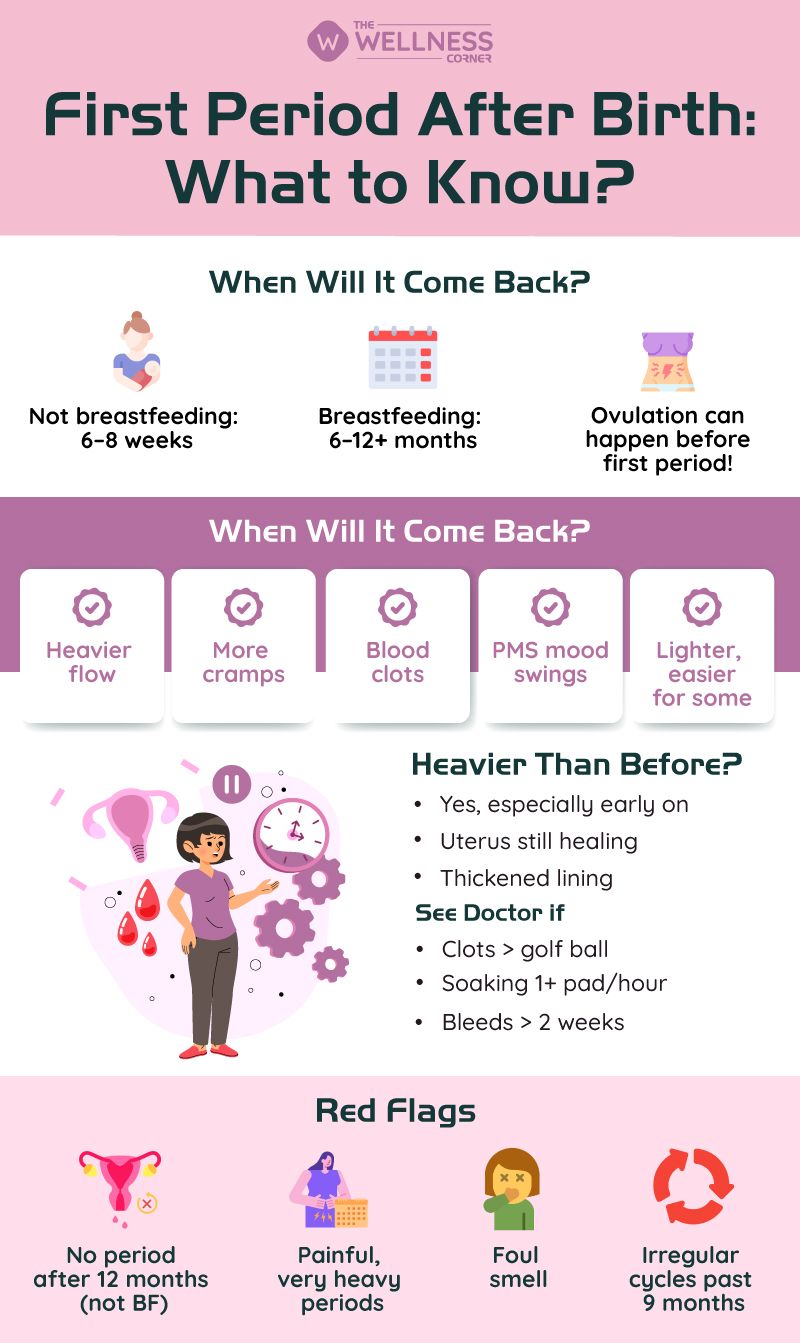Your Period After Pregnancy: What’s Normal And What’s Not?
4 months ago
5 minute read.

Pregnancy brings with it a whirlwind of physical, emotional, and hormonal changes. And just when you think you’re starting to feel like yourself again after childbirth, your period returns—often in a way that feels unfamiliar or even shocking. Many new mothers are left thinking, "Is this normal?"
If you’ve had a baby recently and are unsure about what to expect when it comes to your menstrual cycle, you’re not alone. From heavy bleeding to spotting, pain, or irregular cycles—your body might be trying to find a new rhythm.
Let’s break down what’s normal, what’s not, and what you should know about your first period after pregnancy.

When Will My Period Return After Pregnancy?
There’s no universal answer to this because every woman’s body is different—and a lot depends on whether or not you’re breastfeeding.
- If not breastfeeding, your period can return as early as 6-8 weeks after giving birth.
- If you are exclusively breastfeeding, your period may not return for 6 months to a year or longer.
Why does breastfeeding delay your period? It all comes down to prolactin, the hormone responsible for milk production. High prolactin levels suppress ovulation, which can delay menstruation. This is why some mothers don’t see a period for the entire time they breastfeed frequently.
That said, just because your period hasn’t come back doesn’t mean you can’t get pregnant. Ovulation can happen before your first period, so don’t rely on breastfeeding alone as birth control.
Is It Normal to Have Irregular Periods After Giving Birth?
Absolutely. Many women notice that their cycles are not as predictable as they were before pregnancy. You might:
- Get your period one month and then skip the next
- Have shorter or longer cycles
- Experience mid-cycle spotting
- Find it hard to track ovulation
This is completely normal for the first few months postpartum, especially as your hormones slowly return to their pre-pregnancy levels.
For some women, irregular cycles can persist for 6 months or more. If things haven’t stabilized by your baby’s first birthday (and you're not breastfeeding), it’s a good idea to check in with your gynecologist.
How Long After Childbirth Do Most Women Get Their Period?
Here’s a rough guide based on your feeding choices:
|
Feeding Method |
Typical Period Return |
|
Exclusively breastfeeding |
6–12 months postpartum |
|
Mixed feeding (breast + formula) |
3–6 months postpartum |
|
Formula feeding |
6–8 weeks postpartum |
These are averages, not rules. Some women get their period back 4 weeks after birth, while others don’t see it return for over a year.
Does Your Period Change After Having a Baby?
For many women, the answer is yes. Your period after pregnancy might not look or feel the same as it did before.
You might notice:
- Heavier bleeding in the first few cycles
- Longer or shorter periods
- More or less cramping
- Clots in the blood
- Increased fatigue or PMS symptoms
This happens because your uterus has expanded, and your cervix might have changed shape. Hormonal fluctuations also play a major role in how your periods feel.
Some women find that their periods get lighter and less painful, especially if they had painful periods before pregnancy. Others report heavier bleeding and more intense cramps. It depends on your hormonal makeup and how your body is healing.
Does Breastfeeding Delay Your Period?
Yes. Exclusive breastfeeding can delay the return of your menstrual cycle—sometimes for several months or even longer. This is a natural process known as lactational amenorrhea, and it's your body’s way of spacing out pregnancies.
However, once:
- Your baby starts sleeping longer stretches,
- You introduce formula or solid foods, or
- You start to wean,
... your prolactin levels may drop, and your period could return.
Are Periods Heavier After Pregnancy?
Many women say yes, at least for the first few cycles. Your uterus is adjusting, and your endometrial lining may be thicker than before.
You may:
- Soak through pads faster than usual
- Pass small blood clots
- Bleed for 7 to 10 days instead of your usual 4–5
While this can be unsettling, it’s usually nothing to worry about. However, call your doctor if:
- You’re soaking through more than one pad per hour
- You're passing clots larger than a golf ball
- Bleeding continues for more than 2 weeks
Also Read: What Does The Menstrual Blood Color Say About Your Health?
Why Are My Periods More Painful After Giving Birth?
Unfortunately, some women experience more intense menstrual cramps postpartum. This could be due to:
- Increased prostaglandin production (chemicals that trigger uterine contractions)
- Uterine tissue healing and scarring
- The uterus is trying harder to get back to its normal size.
In some cases, painful periods could also signal underlying conditions like:
- Endometriosis
- Fibroids
- Adenomyosis occurs when the uterine lining develops into a muscle layer.
If the pain is debilitating or new, consult your healthcare provider.
Also Read: Helping Your Wife Cope with Postpartum Depression
Is Spotting Normal After the First Postpartum Period?
Yes, occasional spotting is common after your first few periods. Your uterus may not be fully healed, or your hormones may still be adjusting—especially if you’re still breastfeeding.
You might notice:
- Light pink or brown discharge
- Spotting between periods
- Spotting after physical exertion or sex
This is usually only for a while. However, spotting that is persistent, causes pain, or has a foul odor should be investigated. It might indicate:
- An infection
- Retained placenta fragments
- Uterine abnormalities
Also Read: What Does The Menstrual Blood Color Say About Your Health?
When Should I Worry?
While changes are expected, here are some red flags that should prompt a visit to your OB-GYN:
- No period for over 12 months postpartum if you're not breastfeeding
- Heavy bleeding that soaks a pad an hour for several hours
- Severe cramps or sudden pelvic pain
- Foul-smelling discharge
- Periods that continue to be highly irregular after 6–9 months

Takeaway: Be Patient With Your Body
Your body has done something miraculous, and it needs time to reset. The return of your period after pregnancy is just one of the many changes you’ll experience postpartum. And just like every pregnancy is different, every period journey is unique.
Try to:
- Track your cycles using a period app
- Stay hydrated
- Use heat therapy for cramps
- Consult your doctor if anything feels off
Give yourself grace. Your body is still recovering—and healing doesn’t always follow a perfect schedule.
Leave a Comment
Related Articles
Health Checks @ Home
Service
Explore
© 2025 Truworth Health Technologies Pvt. Ltd.




